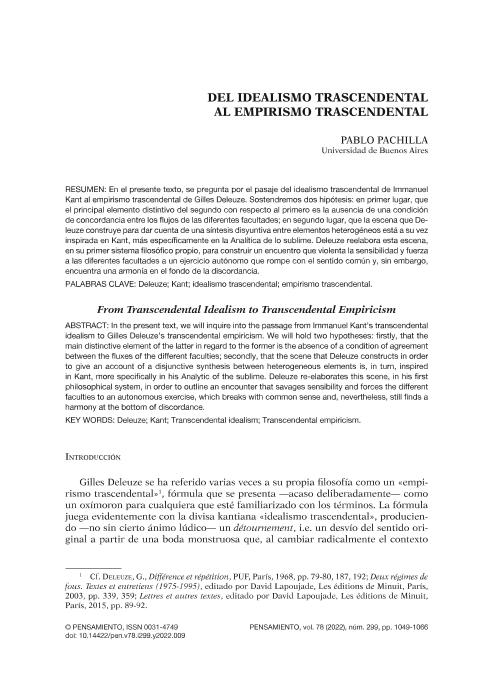Mostrar el registro sencillo del ítem
dc.contributor.author
Pachilla, Pablo Nicolás

dc.date.available
2023-07-03T13:25:36Z
dc.date.issued
2022-05
dc.identifier.citation
Pachilla, Pablo Nicolás; Del idealismo trascendental al empirismo trascendental; Universidad Pontificia Comillas de Madrid; Pensamiento; 78; 299; 5-2022; 1049-1066
dc.identifier.issn
0031-4749
dc.identifier.uri
http://hdl.handle.net/11336/202010
dc.description.abstract
En el presente texto, se pregunta por el pasaje del idealismo trascendental de Immanuel Kant al empirismo trascendental de Gilles Deleuze. Sostendremos dos hipótesis: en primer lugar, que el principal elemento distintivo del segundo con respecto al primero es la ausencia de una condición de concordancia entre los flujos de las diferentes facultades; en segundo lugar, que la escena que Deleuze construye para dar cuenta de una síntesis disyuntiva entre elementos heterogéneos está a su vez inspirada en Kant, más específicamente en la Analítica de lo sublime. Deleuze reelabora esta escena, en su primer sistema filosófico propio, para construir un encuentro que violenta la sensibilidad y fuerza a las diferentes facultades a un ejercicio autónomo que rompe con el sentido común y, sin embargo, encuentra una armonía en el fondo de la discordancia.
dc.description.abstract
In the present text, we will inquire into the passage from Immanuel Kant’s transcendental idealism to Gilles Deleuze’s transcendental empiricism. We will hold two hypotheses: firstly, that the main distinctive element of the latter in regard to the former is the absence of a condition of agreement between the fluxes of the different faculties; secondly, that the scene that Deleuze constructs in order to give an account of a disjunctive synthesis between heterogeneous elements is, in turn, inspired in Kant, more specifically in his Analytic of the sublime. Deleuze re-elaborates this scene, in his first philosophical system, in order to outline an encounter that savages sensibility and forces the different faculties to an autonomous exercise, which breaks with common sense and, nevertheless, still finds a harmony at the bottom of discordance.
dc.format
application/pdf
dc.language.iso
spa
dc.publisher
Universidad Pontificia Comillas de Madrid
dc.rights
info:eu-repo/semantics/openAccess
dc.rights.uri
https://creativecommons.org/licenses/by-nc-nd/2.5/ar/
dc.subject
DELEUZE
dc.subject
KANT
dc.subject
EMPIRISMO TRASCENDENTAL
dc.subject
IDEALISMO TRASCENDENTAL
dc.subject.classification
Filosofía, Historia y Filosofía de la Ciencia y la Tecnología

dc.subject.classification
Filosofía, Ética y Religión

dc.subject.classification
HUMANIDADES

dc.title
Del idealismo trascendental al empirismo trascendental
dc.title
From Transcendental Idealism to Transcendental Empiricism
dc.type
info:eu-repo/semantics/article
dc.type
info:ar-repo/semantics/artículo
dc.type
info:eu-repo/semantics/publishedVersion
dc.date.updated
2023-07-02T14:51:21Z
dc.identifier.eissn
2386-5822
dc.journal.volume
78
dc.journal.number
299
dc.journal.pagination
1049-1066
dc.journal.pais
España

dc.journal.ciudad
Madrid
dc.description.fil
Fil: Pachilla, Pablo Nicolás. Consejo Nacional de Investigaciones Científicas y Técnicas; Argentina. Universidad de Buenos Aires; Argentina
dc.journal.title
Pensamiento
dc.relation.alternativeid
info:eu-repo/semantics/altIdentifier/url/https://revistas.comillas.edu/index.php/pensamiento/article/view/13028
dc.relation.alternativeid
info:eu-repo/semantics/altIdentifier/doi/http://dx.doi.org/10.14422/pen.v78.i299.y2022.009
Archivos asociados
